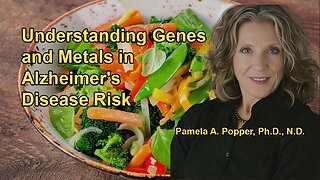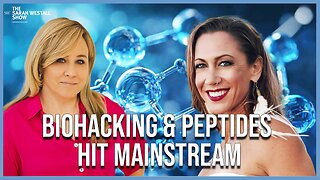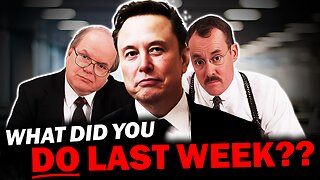Premium Only Content

Is The Digitization Of Farms Better For Our Health?
Is The Digitization Of Farms Better For Our Health?
Stacy Malkan
• https://usrtk.org/
• Book - Not Just a Pretty Face
#StacyMalkan #CosmeticDangers #EnvironmentalHealthIssues
Stacy Malkan is co-founder and managing editor of U.S. Right to Know, a nonprofit investigative research group focused on promoting transparency for public health usrtk.org.
She began working on environmental health issues in 2001 and has researched food and agriculture, with a focus on agrichemical industry misinformation campaigns, since 2012.
Stacy is author of the award-winning book, Not Just a Pretty Face: The Ugly Side of the Beauty Industry. The book Is a The girls' guide to giving the cosmetics industry a makeover.
Lead in lipstick? 1,4 dioxane in baby soap? Coal tar in shampoo? How is this possible?
Simple. The $35 billion cosmetics industry is so powerful that they've kept themselves unregulated for decades.
Not one cosmetic product has to be approved by the US Food and Drug Administration before hitting the market.
Incredible? Consider this:
The European Union has banned more than 1,100 chemicals from cosmetics. The United States has banned just 10.
Only 11% of chemicals used in cosmetics in the US have been assessed for health and safety – leaving a staggering 89% with unknown or undisclosed effects.
More than 70% of all personal care products may contain phthalates, which are linked to birth defects and infertility.
Many baby soaps are contaminated with the cancer-causing chemical 1,4 dioxane.
It's not just women who are affected by this chemists' brew. Shampoo, deodorant, face lotion and other products used daily by men, women and children contain hazardous chemicals that the industry claims are "within acceptable limits." But there's nothing acceptable about daily multiple exposures to carcinogenic chemicals-from products that are supposed to make us feel healthy and beautiful.
Not Just a Pretty Face delves deeply into the dark side of the beauty industry and looks to hopeful solutions for a healthier future. This scathing investigation peels away less-than-lovely layers to expose an industry in dire need of an extreme makeover.
Stacy Malkan is also a co-founder of the Campaign for Safe Cosmetics, a coalition of health groups that exposed hazardous chemicals in nail polish, baby products, make-up and hair products and pressured companies to reformulate to safer products.
Her work has been published in Time magazine, New York Times, Washington Post, Nature Biotechnology and many other outlets. She has appeared in Teen Vogue, Good Morning America, Wall Street Journal, San Jose Mercury News, San Francisco Chronicle, Democracy Now! and documentary films including The Human Experiment produced by Sean Penn, Pink Skies and Stink Movie (now playing on Netflix). Stacy was media director for the California Right to Know ballot initiative to label genetically engineered foods.
For eight years, she served as communications director for Health Care Without Harm, an international coalition of health groups working to transform health care, so it is no longer a source of environmental harm. Prior to that role, she worked for a decade as a journalist, editor, and newspaper publisher in Colorado. She now lives in the California Bay Area with her husband and son.
To Contact Stacy Malkan go to usrtk.org
-
 17:43
17:43
TheRealTruthAboutHealth
2 days agoUnderstanding the Role of Genes and Metals in Alzheimer's Risk With Dr. Pam Popper
276 -
 56:02
56:02
Sarah Westall
9 hours agoBiohacking & Peptides: Weight loss, Anti-Aging & Performance – Myth vs Reality w/ Dr. Diane Kazer
41.4K14 -
 11:22
11:22
Bearing
19 hours ago"Anxious & Confused" Federal Workers FREAK OUT Over DOGE Efficiency Email 💥
56.3K63 -
 1:31:20
1:31:20
Flyover Conservatives
1 day agoUS STOCK MARKET: Sinking Ship - Dr. Kirk Elliott; How I Fought Back Against Woke Schools & Stopped Gender Bathrooms - Stacy Washington | FOC Show
62.8K1 -
 1:08:09
1:08:09
Donald Trump Jr.
13 hours agoFBI Dream Team, Plus Taking Your Questions Live! | Triggered Ep.219
202K272 -
 7:32:37
7:32:37
Akademiks
13 hours agoDrake and PartyNextDoor '$$$4U' Album Sells 250K first week. BIG AK IS BACK.
120K18 -
 3:12:08
3:12:08
MyronGainesX
12 hours ago $32.10 earnedDan Bongino Named FBI Deputy Director, Trump Meets Macron, And More!
97.5K29 -
 3:12:31
3:12:31
vivafrei
12 hours agoBarnes Live from Seattle - Defending Benshoof in a Case that is CRAY CRAY!
155K49 -
 2:12:12
2:12:12
Robert Gouveia
12 hours agoLiberals EXPLODE over Elon's Email; Lawsuits FLY; Sanctions?? Congrats Dan!
116K40 -
 1:33:36
1:33:36
Redacted News
12 hours agoBREAKING! PUTIN LAUNCHES MASSIVE OFFENSIVE IN UKRAINE AS EUROPEAN LEADERS PUSH FOR MORE WAR
193K269